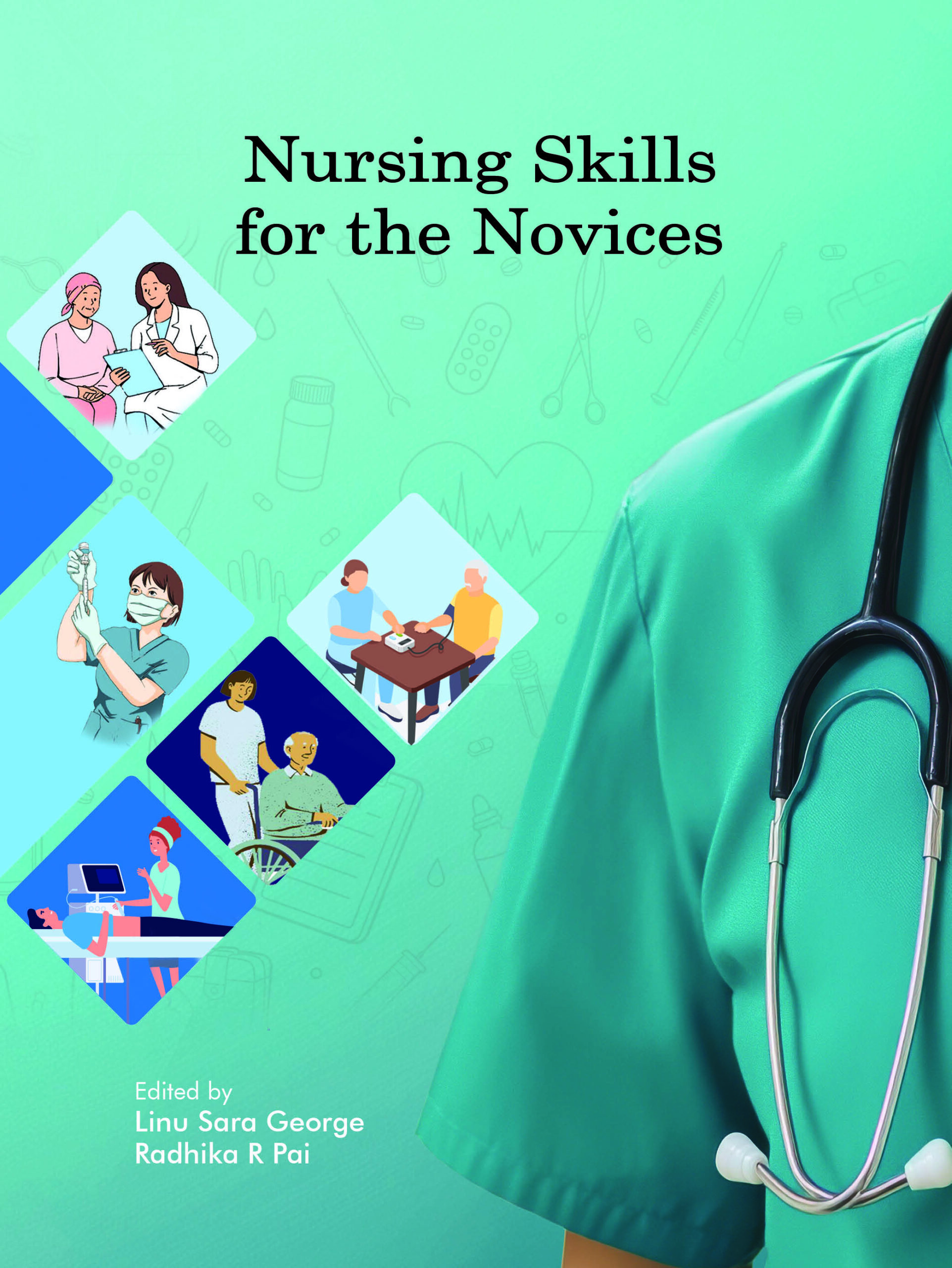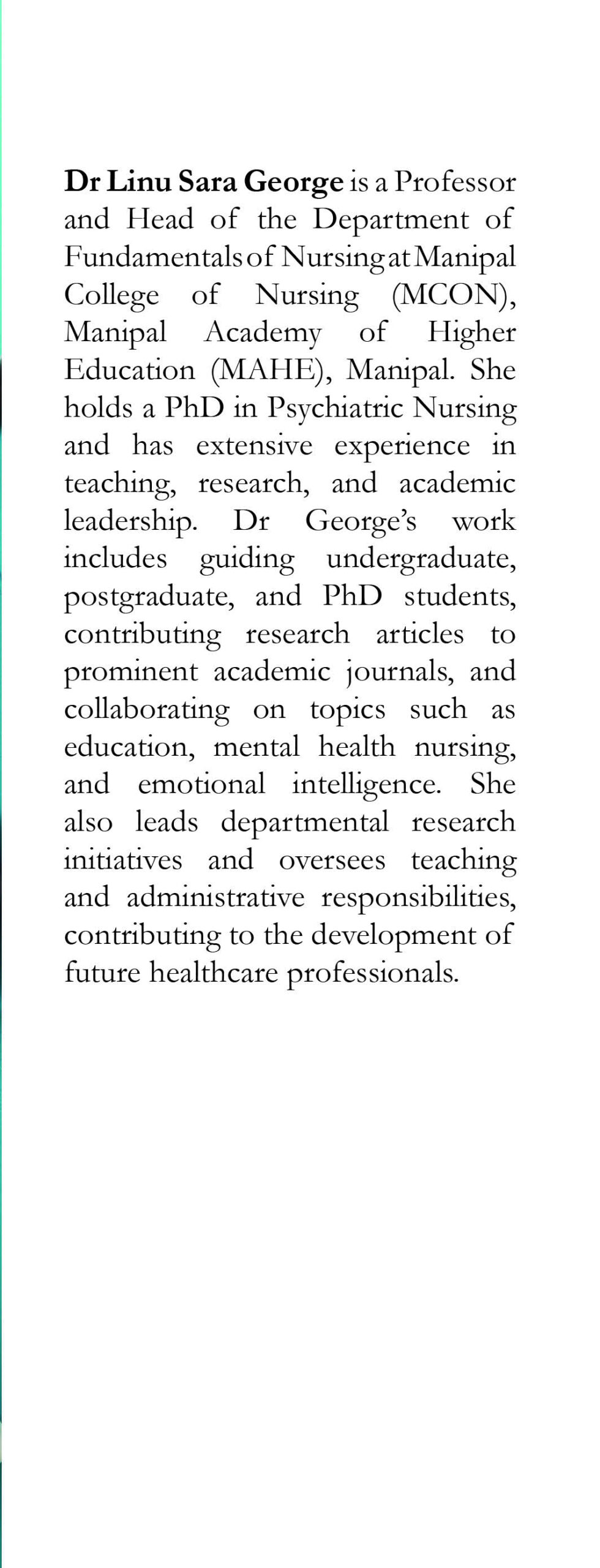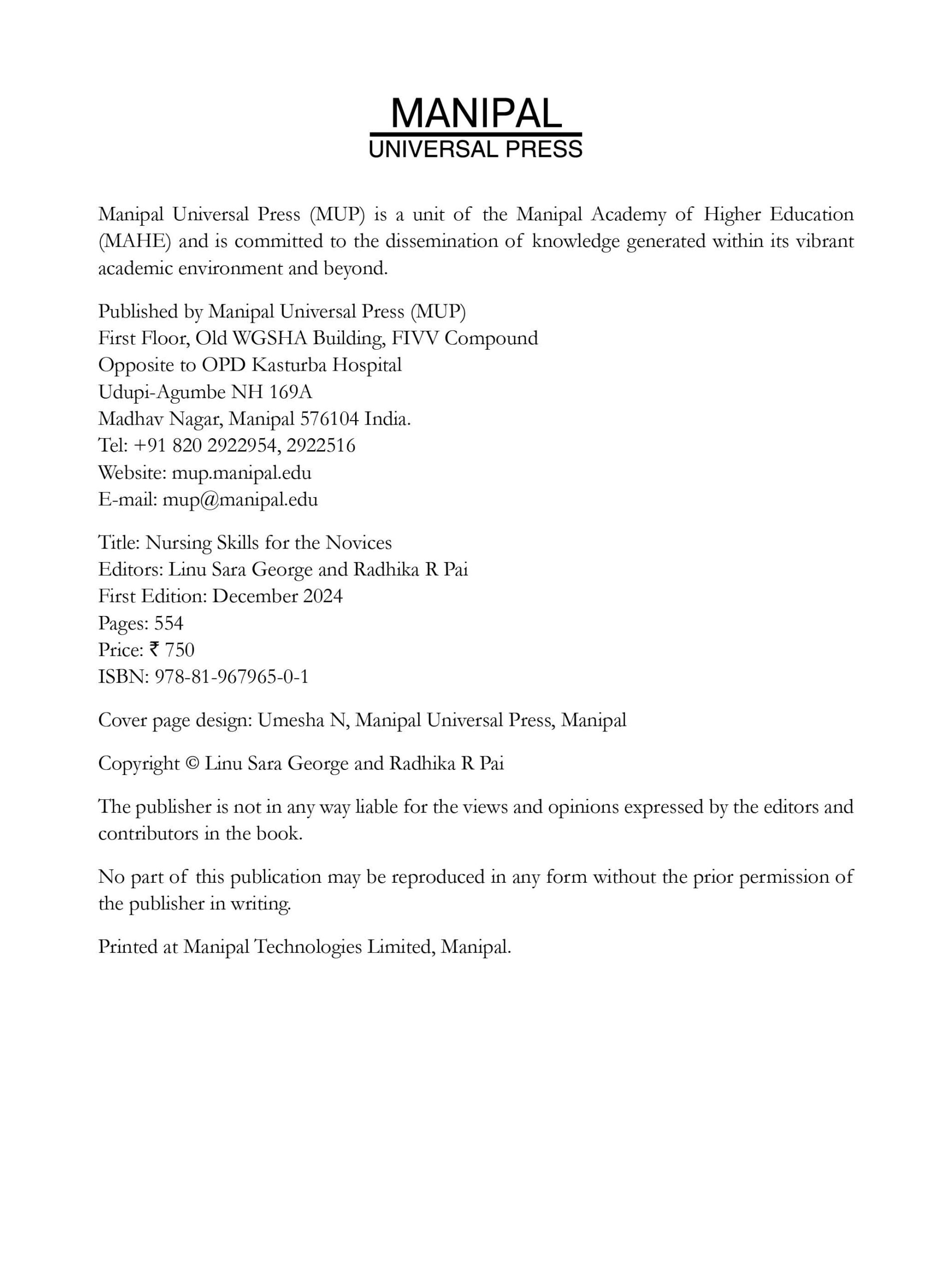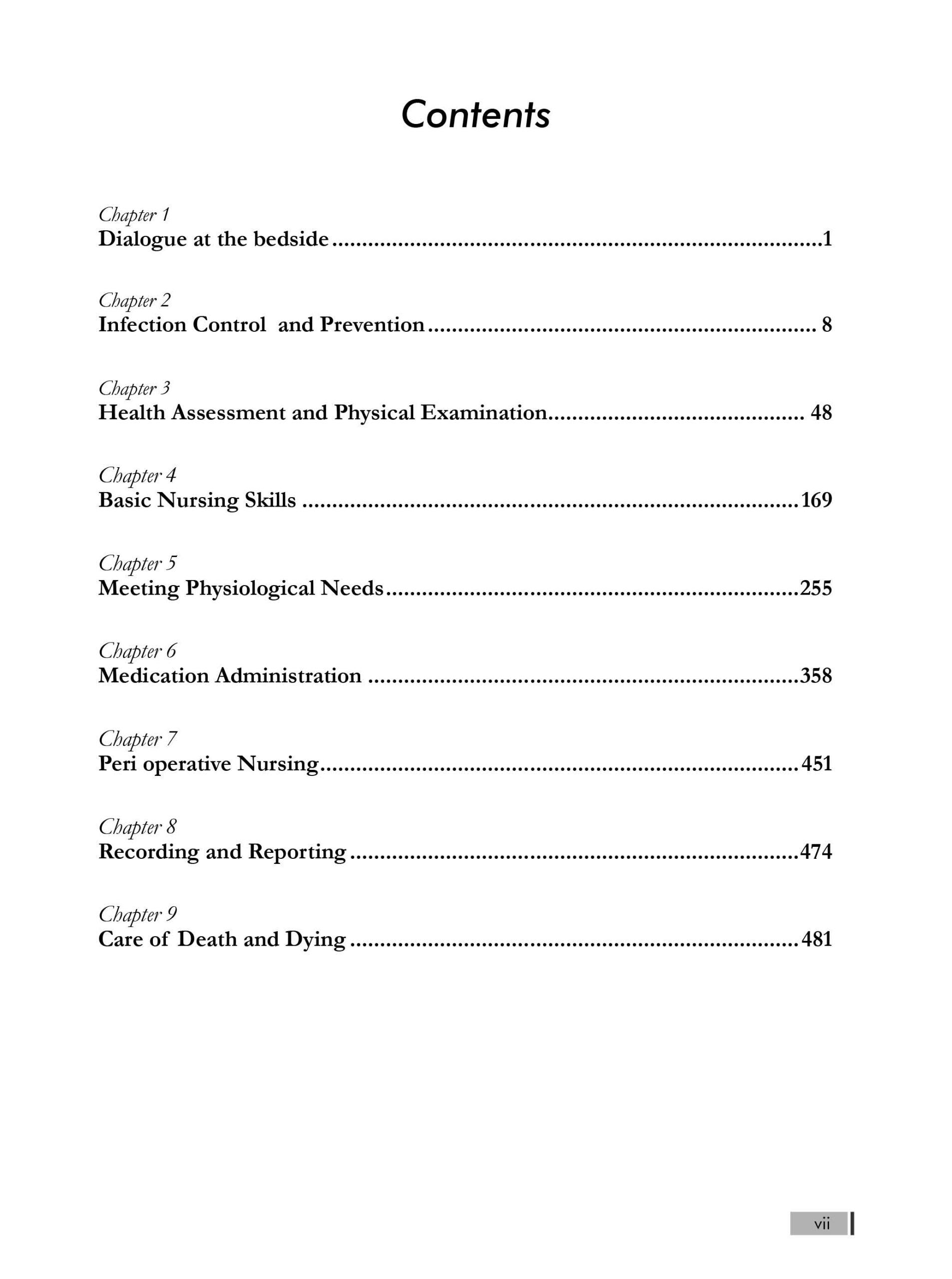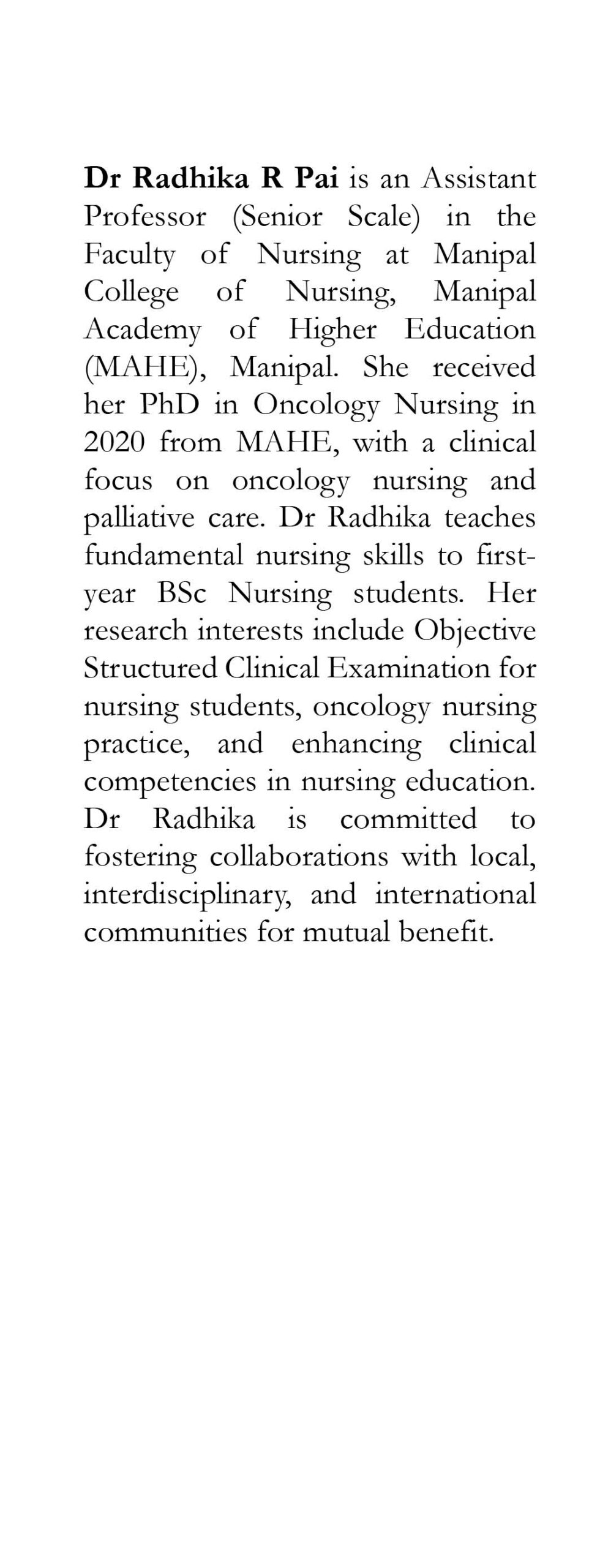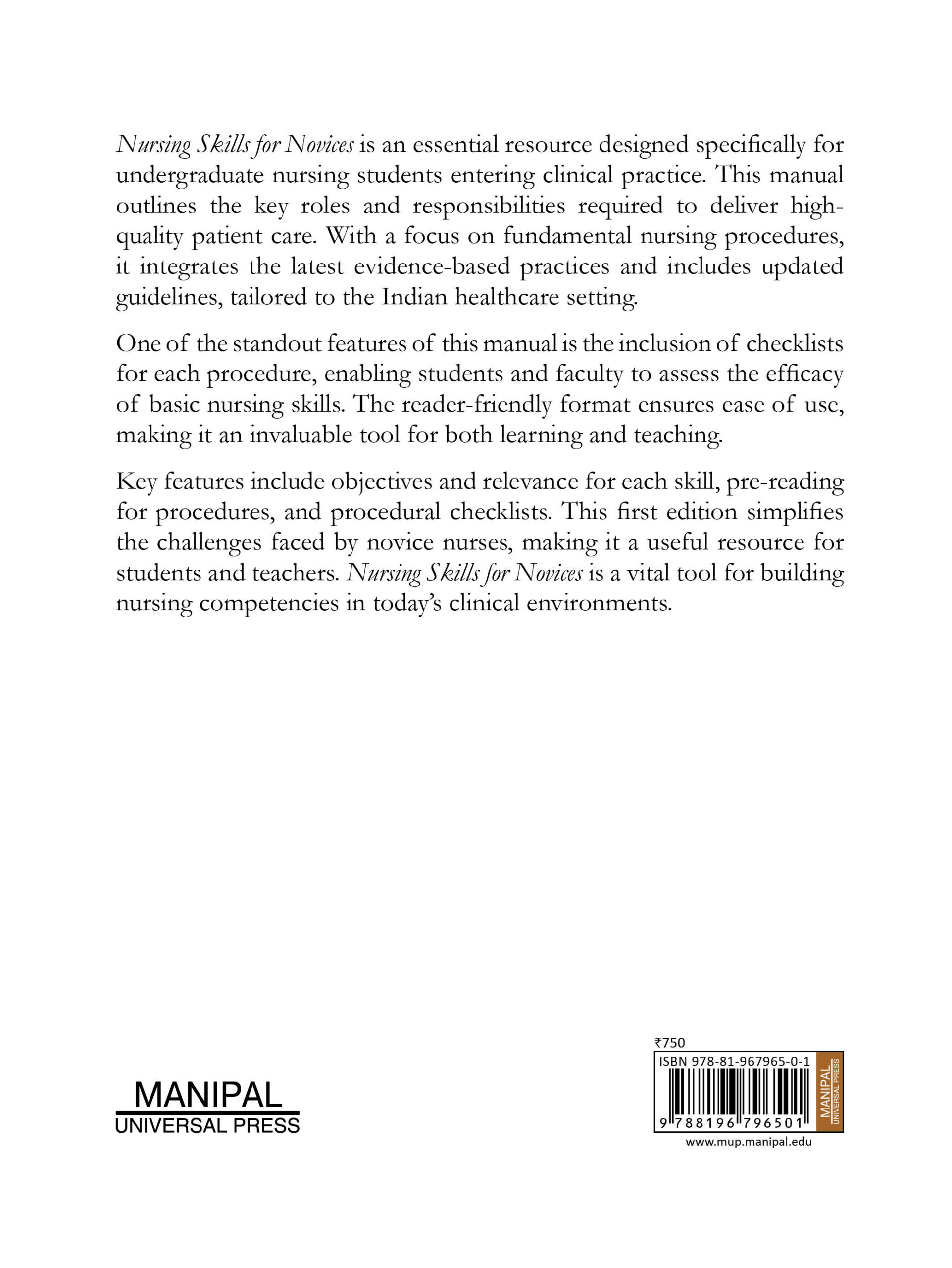Nursing Skills for the Novices
₹750.00
Editors: Linu Sara George and Radhika R Pai
Nursing Skills for Novices is an essential resource designed specifically for undergraduate nursing students entering clinical practice. This manual outlines the key roles and responsibilities required to deliver high-quality patient care. With a focus on fundamental nursing procedures, it integrates the latest evidence-based practices and includes updated guidelines, tailored to the Indian healthcare setting.
One of the standout features of this manual is the inclusion of checklists for each procedure, enabling students and faculty to assess the efficacy of basic nursing skills. The reader-friendly format ensures ease of use, making it an invaluable tool for both learning and teaching.
Key features include objectives and relevance for each skill, pre-reading for procedures, and procedural checklists. This first edition simplifies the challenges faced by novice nurses, making it a useful resource for students and teachers. Nursing Skills for Novices is a vital tool for building nursing competencies in today’s clinical environments.
Interested readers may write to us at mup@manipal.edu about purchasing the book.
| Category: | Academic and Reference |
|---|
| Format |
|---|
Related products
-
The Path of Proofs – Pramanapaddhati of Sri Jayatirtha
₹250.00Author: Shrinivasa Varakhedi
Epistemology of the Dvaita school of thought is presented in this short monograph Pramāṇapaddhati – the Path of Proofs, authored by Śrī Jayatīrtha. Epistemology is the science of knowledge that deals with the origin and nature of cognitive events and their means.
Ācārya Madhva, the proponent of the Dvaita school, has explained about the epistemology of this new school in his works. Since Madhva’s language is profound and the elucidations are scattered over his several works, it is difficult to comprehend for a novice. Hence, Pramāṇapaddhati was composed by his successor of third generation Śrī Jayatīrtha. The simple and captivating
style of this work is sure to ignite the interest in the readers to conduct further study in detail. This work is not only regarded as a standard textbook of Dvaita studies, but also considered as a basic authentic work in the Dvaita dialectic literature.This work is rendered into English by Prof Shrinivasa Varakhedi adopting the mirror-translation method.
Interested readers may write to us at mup@manipal.edu about purchasing the book.Also available on

-
Comets – Nomads of the Solar System
₹290.00This book introduces the general reader to the world of comets – those celestial visitors from the outer Solar System that occasionally visit the Earth’s neighbourhood and put up spectacular shows in the night sky. The world had geared up for just such a show at the end of 2013, when Comet ISON was expected to light up the night sky. Using the occasion to bring the world of comets to those interested, this book is a delightful read about the quirky world of these unpredictable visitors. Apart from lucidly and accurately updating the reader about what comets are, where they come from, why is it that they assume the fantastic shapes they do etc. “Comets” also regales the reader with myths about comets in various cultural contexts, snippets about famous comets in the history of mankind, anecdotes on comet discoveries and discoverers, the bewildering procedures followed while naming comets and much more. The book takes a hard look at the hype surrounding the fiery expectations about Comet ISON an cautions the reader that, while there was a good chance of the comet blazing forth in the skies of December 2013, there was a realistic chance that the comet would not survive its close encounter with the Sun. Sadly, the pessimistic predictions came true and the comet disintegrated as it went around the Sun. As we wait for chance to throw us a Great Comet to gaze at in the future, “Comets: Nomads of the Solar System” is an excellent guide to prepare for the event!
Interested customers may write to us at mup@manipal.edu about purchasing the book.
Also available on

-
Early Buddhist Artisans and their Architectural Vocabulary
₹1,600.00Author: S Settar
The early Buddhist architectural vocabulary, being the first of its kind, maintained its monopoly for about half a millennium, beginning from the third century BCE. To begin with, it was oral, not written. The Jain, Hindu, and other Indian sectarian builders later developed their vocabulary on this foundation, though not identically. An attempt is made here to understand this vocabulary and the artisans who first made use of it.
In the epigraphic ledger, the first reference to the mythical creator of the universe, the Visvakarma (Visakama), is made on the thupas at Sanchi and Kanaganahalli; the earliest excavators of cave temples, comprising five specialists – selavdhaki, nayikamisa, kadhicaka, mahakataka and mithaka – as well as a team of master-architects and supervisors, called the navakamis, appear at Kanheri. Besides these, there were also others called avesanis, atevasinas, acaryas, and upajjhayas all over the Buddhist world. The list does not end with these, because there were yet others called vadhakis (carpenters), seli-vadhakis (stonecutters), sela-rupakas (stone sculptors), mithakas (polishers), and so on. All these artisans who have recorded their life stories on the stone surface are identified, and their professional contributions evaluated here for the first time.
International Edition available on South Asia Edition available on -
Writing the self in Illness: Reading the Experiential through the Medical Memoir
₹240.00Author: Amala Poli
Writing the Self in Illness: Reading the Experiential Through the Medical Memoir is MUP’s refreshing venture into the developing fields of Medical and Health Humanities with an aim to consider the necessity of the narrative knowledge as complementary to the contemporary notions of well-being, illness, and healthcare.
Is individual happiness contingent on health and well-being “How does one find happiness in the throes of illness” In the present-day scenario, wherein medical practice is largely dominated by evidence-based understanding, diagnostic language, and problem-solving methods, the discipline of Medical Humanities emerges with a reciprocal dialogue between Humanities, Social Sciences, Health, and Medicine. The study of varied experiential narratives – literary works and unmediated accounts of patients and healthcare professionals, is foregrounded in Medical Humanities to amplify knowledge and understanding about the complexity of encounters with illness and their transformational quality in a nuanced manner. Both thought-provoking and informative, this publication brings about the anecdotal form of personal narratives in the light of medical discourses along with the specific cultural context of the narrative.
The present publication seeks to be an important reading for students and academics in the field of medical humanities, health professionals or medical practitioners, as well as scholars aspiring to venture into this flourishing field.Interested readers may write to us at mup@manipal.edu about purchasing the book.
-
The Practice of Geopolitics
₹850.00Author: M D Nalapat
Intended to be a Practioner’s Guide to Geopolitics, the book provides a look into the thought processes that generate correct and timely analysis of global events. Geopolitics needs to weave within its analytical grasp economics, society, strategy and even culture, as the science deals with overall national capabilities as well as the mutal synergy and frictions between nations. Although a broad range of subjects has been covered in the book, each is anchored in the ground reality of events having a profound impact on the lives of citizens and on world events. The growing interconnectedness of the globe has resulted in a need to do away with the popular west centric models of international relations and to view events not through that single prism but from a holistic viewpoint that accepts the relevance and maturity of different histories and geographies. What the book provides is an alternative Weltanschauung to the dominant models of geopolitical analysis, so that the science is enabled to cross beyond the narrow boundaries which have confined. The scope and applicability of its analysis. The rise of Asia needs a geopolitical vision unique to the continent, and this is what has been provided by Professor Nalapat.
Interested readers may write to us at mup@manipal.edu about purchasing the book.
-
Childhood Cancer
₹185.00Authors: H S Ballal, P D Gupta
Childhood Cancer is a major medical problem in most of the societies of the modern world. Though enough literature is available on the subject, it is not easily intelligible to common people. An ordinary parent whose ward is affected by any form of childhood cancer would beat a loss without the basic information. This book is aimed at educating a non-professional who wishes to grasp the problem in detail and in a simple way. The book primarily deals with the signs and symptoms of cancer in children which enable early detection. It is written in a lucid manner to remove the myth among parents that diagnosis of cancer in children amounts to a death sentence. Many of the childhood cancers, if detected early, can be cured completely, and the patients can live the rest of their lives like any other normal people. The book is an attempt to create this awareness among parents through proper information about the disease. Further, the book would also serve as a manual for MBBS students and professionals in other fields for primary treatment and management of the childhood cancer patients.
Interested customers may write to us at mup@manipal.edu about purchasing the book.
Also available on

-
Kriti Jagattu
₹310.00Author: T P Ashok
ಪ್ರೊ. ಟಿ. ಪಿ. ಅಶೋಕ ಅವರ ಇತ್ತೀಚಿನ ಕೃತಿ ಕೃತಿ ಜಗತ್ತು ಇಪ್ಪತ್ತಾರು ಪ್ರಬಂಧಗಳನ್ನು ಒಳಗೊಂಡ ಪುಸ್ತಕವಾಗಿದ್ದು, ವಿವಿಧ ದೇಶಗಳು, ಭಾಷೆಗಳು, ಸಂಪ್ರದಾಯಗಳು, ಪ್ರಕಾರಗಳು ಇತ್ಯಾದಿಗಳಿಗೆ ಸಂಬಂಧಿಸಿದ ಕೃತಿಗಳನ್ನು ಪರಿಚಯಿಸುವ, ವಿಶ್ಲೇಷಿಸುವ, ವಿಮರ್ಶಿಸುವ ಮತ್ತು ಸ್ಪಷ್ಟಪಡಿಸುವ ಮತ್ತು ಸಾಹಿತ್ಯದ ಒಂದು ನೋಟವನ್ನು ನೀಡುತ್ತದೆ. ಇಡೀ ಪ್ರಪಂಚ. ಪ್ರಬಂಧಗಳು ಸಾಮಾಜಿಕ, ಸಾಂಸ್ಕೃತಿಕ ಮತ್ತು ರಾಜಕೀಯ ಘಟನೆಗಳಿಗೆ ಮತ್ತು ಕಳೆದ ಐನೂರು ವರ್ಷಗಳಲ್ಲಿ ನೈತಿಕ, ಮಾನಸಿಕ ಮತ್ತು ಆಧ್ಯಾತ್ಮಿಕ ಬಿಕ್ಕಟ್ಟುಗಳಿಗೆ ಪ್ರಪಂಚದಾದ್ಯಂತದ ಶ್ರೇಷ್ಠ ಬರಹಗಾರರ ಪ್ರತಿಕ್ರಿಯೆಯನ್ನು ಪರಿಣಾಮಕಾರಿಯಾಗಿ ಪ್ರಸ್ತುತಪಡಿಸುತ್ತವೆ. ಈ ಕೃತಿ ಪ್ರಪಂಚವು ಕನ್ನಡ ಸಾಹಿತ್ಯ ಪ್ರಪಂಚದೊಂದಿಗೆ ಸಂಬಂಧವನ್ನು ಸ್ಥಾಪಿಸುತ್ತದೆ ಮತ್ತು ಆದ್ದರಿಂದ ಪುಸ್ತಕದ ವಿಶೇಷ ಮಹತ್ವವನ್ನು ಹೊಂದಿದೆ.
Interested readers may write to us at mup@manipal.edu about purchasing the book.
Also available on

-
Manipal Manual of Ear Mould Making
₹195.00Authors: Venkataraja Aithal U, Rekha Patil and B Rajashekhar
Manipal Manual of Ear Mould Making is a comprehensive workbook of value to students of Audiology & hearing professionals who wish to understand the nuances of this skill that is paramount for optimization of hearing aid fitting. This is a compilation of the authors? years of experience in the deft skills of ear mould making and patient care in Manipal Ear Mould lab. Considerable efforts have gone in to bringing out this manual by incorporating appropriate pictures, stepwise procedures and simple instructions. This manual, besides appraising the readers of the procedure would also assist them in learning the dos and donts picked up out of the authors? clinical experience. This will be a reflection of our ongoing efforts to derive the best out of the rapidly developing technology in the area of hearing impairment.
Interested readers may write to us at mup@manipal.edu about purchasing the book.
Also available on


